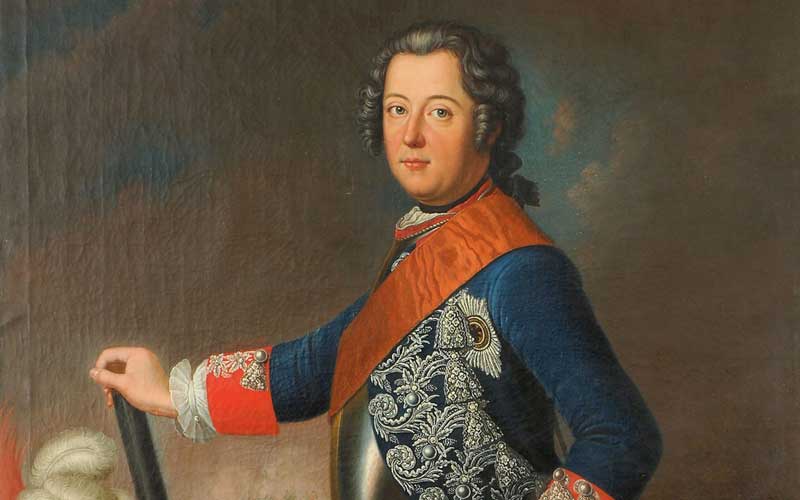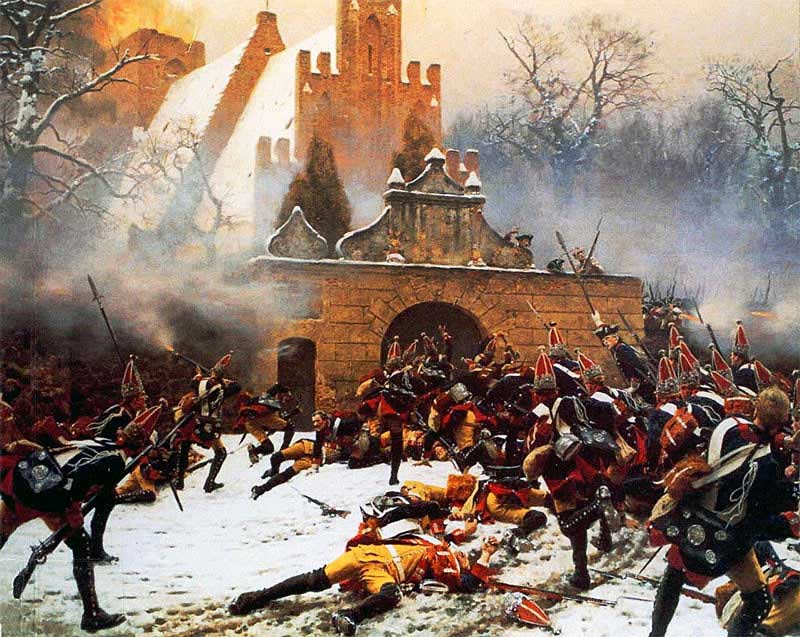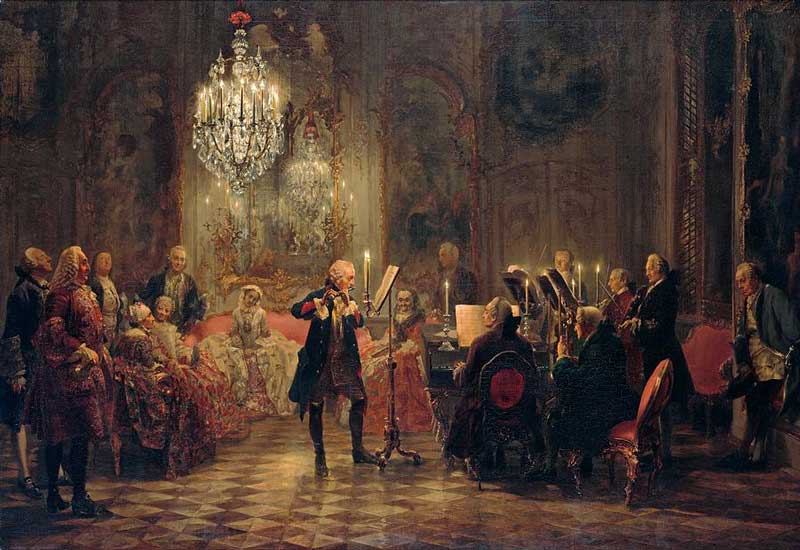
Born in Berlin, Prussia on 24 January 1712, Frederick II was the eldest surviving son of Frederick William I, the King of Prussia, and his wife Sophia Dotthea. Frederick Wilhelm I was grim, abusive and an authoritarian, who used to rule his family and his kingdom with equally stern and paternal intolerance of frivolity. However, as arranged by his mother, Frederick spent his early years with tutors, learning poetry, French culture, and the Greek and Roman classics. As a result, he became more interested in music and philosophy than the art of war. But, habitually clad in a blue military uniform, Frederick William despised these qualities as effeminate and was infuriated by Frederick’s lack of sympathy with his own rigidly puritanical and militaristic outlook. Often he physically abused and humiliated his son in public and forced him into the army and set on a course of military science and governance. This was too much for the young man and with the encouragement and support of his mother and sister Wilhelmina, Frederick soon came into bitter conflict with his father.
In 1730, when he was 18, the prince rebelled and attempted to escape to England with his childhood friend Hans Herman von Katte. Probably, he also had the intention to marry his cousin, Princess Amelia. But, they were caught and arrested for treason. At the end of the drama, Katte was beheaded, as he had attempted to help the prince to escape and Frederick was forced to witness the execution of his best friend. Frederick was pardoned, but he was placed as a junior official in local administration to learn the ways of government. After a partial reconciliation with his father, Frederick was married in 1733, to a member of a minor German princely family, Elizabeth Christine, for whom he never cared, quickly discarded her and never showed any interest in women for the rest of his life.
Prince Frederick was twenty-eight years old when his father died and he ascended to the throne of Prussia on 31 May 1740. Immediately after his accession, he made it very clear to his ministers that he alone would decide his policy. His view about warfare was simple. He preferred short and lively wars that relied on swift, powerful, and decisive military operations. This practice was against the established consensus of military men. But, to achieve this goal, he emphasized battle rather than maneuver, which made Frederick the most aggressive military commander of the 18th century.

As the military successes of the Habsburg against the French and Bavarians alarmed Fredrick, in the early 1742 he invaded Moravia, the region south of Silesia, which was under Maria Theresa of Austria. His incomplete victory in May forced Maria Theresa to cede almost all of Silesia by the Treaty of Berlin in July. However, this prompted the Habsburg forces to be concentrated against France and Bavaria and within the early months of 1744, Maria Theresa’s position became markedly stronger in Germany. It made Fredrick alarmed again and he invaded Bohemia in the month of August 1744.Finally, the Treaty of Dresden was signed in December 1745, which established Prussian rule in Silesia and ended for the time being the series of struggles that had begun five years earlier.
Though the Habsburg Austria and Bourbon France were traditional enemies, they allied together in 1756, following the collapse of the Anglo-Austrian Alliance. In his turn, Fredrick made an alliance with Great Britain and on 29 August 1756 invaded Saxony, which signaled the third Silesian War, as well as the Seven Years’ War, which lasted till 1763. While the Prussian invasion of Saxony was successful, Fredrick was widely criticized for attacking the neutral Saxony. Nevertheless, Saxony provided Prussia with a buffer zone, shielding her southern frontier from Austria. His subsequent invasion of Austrian Bohemia in 1757 ended in his first defeat at the Battle of Kolin and forced him into retreat. However, on 5 November 1757 in the 90 minute Battle of Rossbach, Fredrick completely routed the composite army of French forces and the Imperial Army of the Holy Roman Empire. Rossbach is considered one of the greatest strategic masterpieces of Fredrick. He employed rapid movements to achieve complete surprise and crippled an enemy army twice the size of the Prussian force while suffering negligible casualties. It also marked a turning point in the Seven Years' War, since France refused to send troops against Prussia and observing the military success of Prussia, Britain increased its financial support for Frederick. Immediately after the battle, Fredrick left the site and marched for 13 days to reach Breslau, where he defeated the Austrian army at the Battle of Leuthen, by employing similar tactics.

However, Fredric and Prussia had to pay a heavy price for the ultimate success in the Seven Years' War. In order to finance the war, Frederick had to devalue the Prussian coin five times. Though Prussia lost no territory, her population and army were severely depleted by constant combat and the repeated invasions of Austria, Russia and Sweden. Personally, Frederick lost many of his close friends, best of his officer corps, as well as his beloved sister Wilhelmine, his brother Augustus William and his mother during the war.
With the death of the Empress Elizabeth, the most bitter of all Frederick’s enemies, in January 1762, completely changed the political situation. Peter III, her successor, a great admirer of Prussia and Frederick, signed an armistice in May, followed by a Russo-Prussian peace treaty and this ended the hopes of Maria Theresa to regain Silesia. The war in Germany ended with the Treaty of Hubertusberg on 15 February 1763, which left the province in Fredrick’s hand.
A new Austro-Prussian struggle broke out in the month of July 1778, over the efforts of the emperor Joseph II, the son of Maria Theresa, to gain a large part of Bavaria. As Fredrick always firmly opposed any growth of Habsburg power in Germany, this War of the Bavarian Succession was short lived and it ended with the Treaty of Teschen in May 1779, which was a severe blow to Joseph’s ambitions and a diplomatic victory for Frederick. However, the fear of Habsburg ambitions had a long lasting effect on Fredrick and it continued to haunt him till the end of his reign. It led him to form the United League of Princes in July 1785, in successful opposition to Joseph II and his renewed efforts to acquire the whole of Bavaria in exchange for the Austrian Netherlands. The league included a number of German states, including Hanover, Saxony, and the archbishopric of Mainz.


The first partition of Poland in 1772 was perhaps the most important foreign policy of Fredrick during the second half of his reign. It resulted in Prussia’s control over the Polish province of West Prussia, without Danzig and thus, Brandenburg and Pomerania, considered as the core of the monarchy, became linked with the country, which were otherwise isolated.
Frederick the great, the last titled King of Prussia, declared himself as the King of Prussia after achieving full sovereignty for all historical Prussian lands. He was popularly dubbed as the Soldier-King and under his rule Prussia had vastly increased its territories and became a leading military power in Europe. The Prussian administration under him was the most honest and hardworking in Europe. Tradition and continuity rather than innovation were the hallmarks of his administration. However, he modernized the Prussian bureaucracy and civil service and promoted religious tolerance throughout his realm. He implemented a system of indirect taxation, which would provide the state with more revenue than direct taxation. He allowed freedom of speech, the press and literature and also reformed the judicial system. Most of the judicial tortures were abolished, except the flogging of soldiers, as punishment for desertion. The death penalty could only be carried out, if equipped with a warrant signed by the King himself.
In his early youth, Frederick was more interested in music and philosophy than the art of war. He was brought up by a Huguenot governess and tutors and learned French and German simultaneously. He was a gifted musician who played the transverse flute and composed more than 100 sonatas for the flute as well as four symphonies. He decorated Berlin with majestic buildings, like the Berlin State Opera, St Hedwig’s Cathedral, Prince Henry’s Palace and the Royal Library. Frederick was a great patron of the arts and a collector of paintings and ancient sculptures, as well.

It is considered by many modern biographers that Frederick was primarily homosexual and at the age of 16 he embarked upon an affair with Peter Karl Christoph von Keith, a 17-year-old page of his father. It was claimed by his physician that in 1733, Fredrick had suffered a minor deformity during an operation to cure gonorrhea and convinced himself that he was impotent. However, he pretended to be homosexual in order to appear that he was still virile and capable of intercourse, albeit with men.

Near the end of his life, Frederick grew increasingly solitary and became increasingly critical and arbitrary. At the age of 74, on the morning of 17 August 1786, Frederick the Great died in an armchair in his study at Sanssouci, his favourite summer palace.
